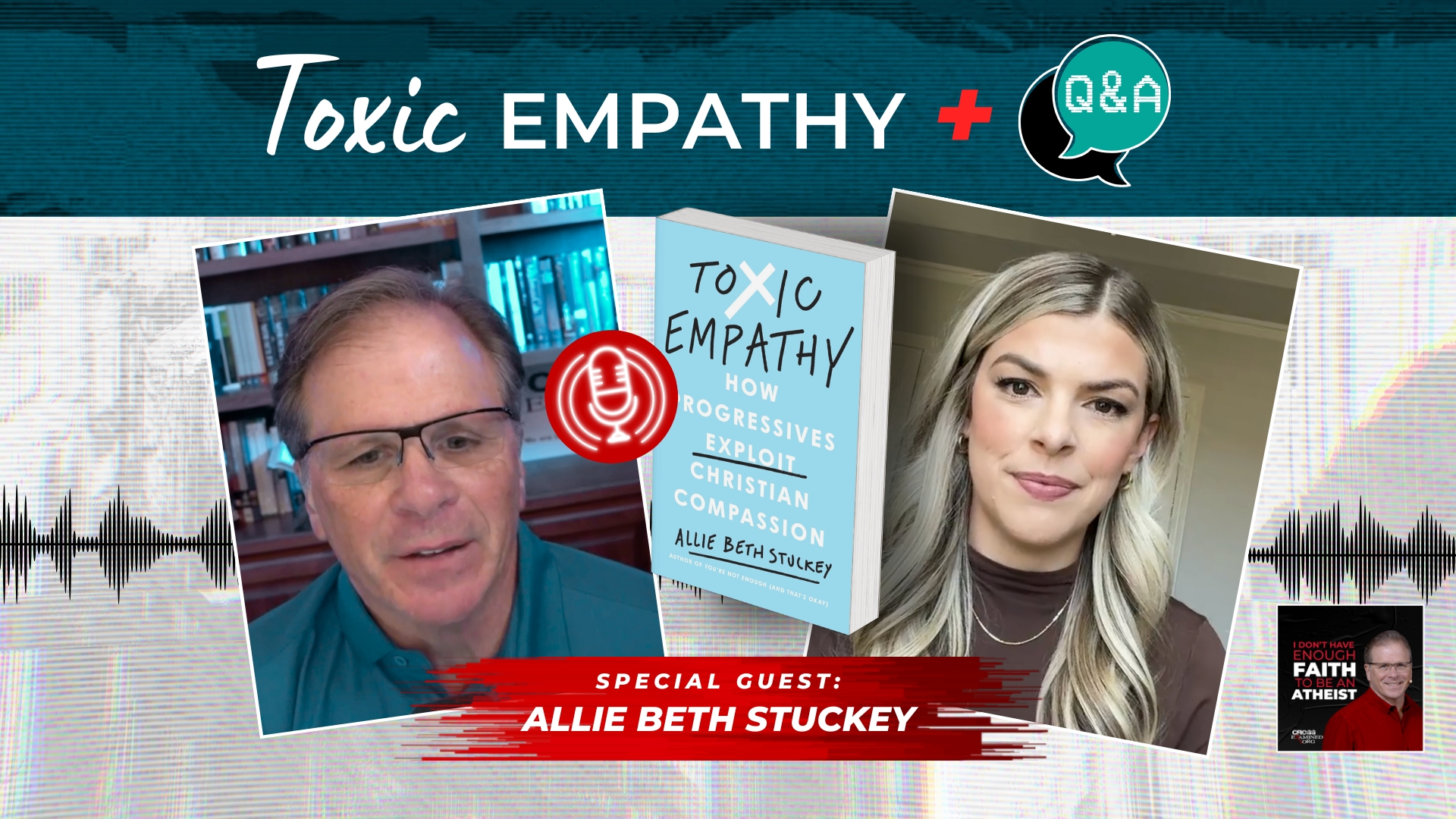Is AI Dangerous? (Part 2)
In Part 1, we may have virtually scared the pants off our readers with our semi-dystopian view of the future. But everything’s going to be okay, mama. You’re fine. I’m fine. Everything’s FINE!

No, really, we’re all fine.

Let me ask you something: can you give me an example of any time the future wasn’t scary? I doubt it. On this side of heaven, the future will always be uncertain. So, what we can do is cling to that which we are certain of – absolute truth. And that truth is found in a person: Jesus. Seek truth, and you’ll find Christ and His promises. Seek Christ, and you’ll find truth and clarity.
Consequently, it’s no surprise that God’s number one enemy is working relentlessly to distort our view of truth. Because that’s ALL he can do, Mama Bears – he can’t touch truth itself. So, we need to get to work to protect our kids from the enemy’s schemes. I can’t emphasize how important this is. Sports and extracurriculars are wonderful but our primary responsibility during this small window of raising children is to train them up in the way they should go (see Proverbs 22:6). We understand how overwhelming all of this can be, so we came up with a short list of foundational lessons to help you out.
5 practical ways we can prepare our kids for AI:
#1 Teach them the habit of asking “Is this true?”
I am convinced that the enemy loves to exploit our natural tendencies so that we take them too far. If you are a mom of multiple children, you already know how each child is wired so differently! Some kids are naturally trusting, so our job will be to teach them not to be gullible. On the other hand, we need to teach our doubting children to walk that fine line of shrewd skepticism without slipping into the pitfall of cynicism.
That being said, we have a real problem in this culture with people believing something is true merely because, to them, it’s believable (or by the mere fact that it’s on YouTube!). I remember having a conversation with a friend during a highly controversial and widely publicized hearing. She told me she believed the man was guilty simply because she would not be surprised if he were! What?! Mama Bears, that is not how we establish truth.
Here are some questions you can teach your kiddos to ask when trying to determine if this piece of content is true:
- What is the purpose of this content?
- Is it to sell me something?
- Is it trying to persuade me to agree?
- Is it trying to get me to click on something?
- What are the sources used?
- Are there multiple sources or just one?
- Are the authors/creators credible?
- Can you find this information on other credible sites as well?
- Does the content creator acknowledge their own biases?
- What worldview, religion, or political aisle is the author/creator coming from?
- Do they present a balanced perspective on the issue? (legitimate pros and cons)
- Who is funding this content and what is their goal?
- Am I being presented with data or opinions (or a mix of both)?
- Are there statistics or facts included that can be verified?
- Is the author/creator making inferences on information? If so, are the inferences actually reasonable? Look for logical fallacies (or errors in their reasoning).
#2 Teach them to be slow to speak…and slow…to share
Social media is designed to trigger our emotions and get us to act – even if that’s just to engage with a post by clicking “like” or “share.”Click To Tweet
How often do we take the time to process the actual reason we want to share something (whether that’s an online or in-person conversation)?
“All things are lawful,” but not all things are helpful. “All things are lawful,” but not all things build up. Let no one seek his own good, but the good of his neighbor (1 Corinthians 10:23-24).
We should ask ourselves: Is what I’m about to share truly edifying to the body of Christ or is it just building up my own image? Is it truly informative or is it propaganda (See point #3 below)? Will this help people prepare for the lies of the enemy or is it merely a way to humiliate my ideological enemy? Remind your kiddos not to allow internet algorithms to manipulate them into playing their game.[1]
#3 Teach them to recognize propaganda
Propaganda is a tactic used to influence the public to buy into a specific point of view or political ideology. The strategy promotes emotionalism (getting people to form their opinions based on their emotions as opposed to using critical thinking) and presents information in a biased and often misleading way. Propaganda is everywhere — politics, social media, advertisements, etc.![2] In politics, we should learn to recognize it on both sides of the aisle. When your kids come across something in the news or even a video (*ahem* TikTok) or image (we see you Instagram) that seems to be promoting a particular narrative, remind them to evaluate whether or not they are being presented with actual information. What are the details of this story or event? What actually happened? Is the story providing information or merely someone’s emotionally charged opinion? If you’re not getting actual information, you’ve probably encountered propaganda.
#4 Teach them proper expectations
Depending on the age of your kids, they are either using AI software or they will be eventually. Users need to understand the limits to this technology so that they are not deceived by it. In Part 1, I explained that not everything ChatGPT spits out is actually true information. There is good reason for this. As Rodney Brooks, Australian roboticist and AI expert, explains, “What the large language models are good at is saying what an answer should sound like, which is different from what an answer should be.” [3]
You see, a software program is spitting out an automated response based on complex algorithms. ChatGPT was designed to respond in a way that sounds like a human response. But it does not have reasoning capabilities like a real human. If you don’t keep that in mind, you could be easily fooled into thinking the response is true merely because it sounds correct. And it doesn’t matter whether we’re talking about ChatGPT or another AI tool. Because no matter how well AI will be able to imitate humans, it will always be something other than human.
#5 Teach them to write
Humans have a tendency toward convenience, whether or not it’s good for them in the long run. This AI language bot stuff is relatively brand new, yet the amount of articles released expressing how high school and college students have already adapted to using AI to write their papers is staggering. One article from the Chronicle is titled, “I’m a Student. You Have No Idea How Much We’re Using ChatGPT. No professor or software could ever pick up on it.”[4]
Aside from the obvious ethical concerns, most students are not aware of how important the process of writing is to our brain development. Writing develops your ability to think critically. You have to plan, organize, develop, and reflect on your thoughts.
According to Dr. M Cecil Smith,
“Writing is a significant literacy activity in modern life that enables individuals to accomplish a variety of personal, intellectual, occupational, and recreational goals. It has been demonstrated, across a variety of investigations, that writing activities yield a number of intellectual, physiological, and emotional benefits to individuals. These benefits include improved [sic] memory function, decreased symptomatology [define], and greater feelings of happiness.”[5]
The temptation to abuse ChatGPT and other AI tech out of convenience (and intellectual laziness) is going to be strong. What we need to drill into our kiddos is the fact that if their critical thinking skills are not constantly being sharpened, they will be vulnerable to being manipulated and controlled. No one wants to be controlled. Help them to understand the importance of writing and developing their OWN thoughts, so that they can recognize when politicians, the media, or any other person is trying to manipulate them.
Final thoughts
It might be tempting to shield our kids completely from the dangers of the virtual world – and there is totally a season for that. For those mama bears with littles, the young years are a good time to lay that foundation of critical thinking skills. But the world we live in is becoming increasingly dependent on technology and, at the appropriate age, our kids will need to be trained and prepared for it.
Consider how much of what makes up our worldview is now being delivered to us digitally. Mama Bears, this kind of training is not optional. Evaluating every message that we encounter can be exhausting. But it’s like strengthening a muscle – the more you practice it, the more you strengthen your mind and it becomes natural. Keep in mind that we are not designed to be informed about every single possible event or new piece of information on the planet. Because of the internet we have access to it all, but remind your kiddos that they are in control of what they allow to take up mental space.
We are not obligated to know everything about everything, and God never intended us to. But we would be wise to hold our opinions loosely on the things we haven’t been able to thoroughly research.Click To Tweet
When considering AI and how it will impact our kids’ futures, there is so much more to consider than we can cover here. AI tech is being used to scam people. It is raising serious ethical concerns. It could impact future employment opportunities. People could even start developing relationships with AI bots. That’s super weird but not unheard of.[6] We can see that awareness is undeniably important. But don’t let it completely overwhelm you. The world has always been a scary place with many uncertainties. But Jesus told us, “In this world you will have trouble. But take heart! I have overcome the world” (John 16:33).
References:
[1] We recommend the film, The Social Dilemma (2020).
[2] A classic example of propaganda is the Uncle Sam poster stating “I want YOU for U.S. Army!”
[3] Rodney Brooks, quoted in Victor Tangermann, “AI Expert Says ChatGPT is Way Stupider Than People Realize,” The Byte, May 21, 2023, https://futurism.com/the-byte/ai-expert-chatgpt-way-stupider?fbclid=IwAR3bU81sys9tSkoX_7q3lWA0pnMI3pD5UPwV-60rOczsYyBFgTmKVF8-zm0.
[4] Owen Kichizo Terry, “I’m a Student. You Have No Idea How Much We’re Using ChatGPT,” The Chronicle, May 12, 2023, https://www.chronicle.com/article/im-a-student-you-have-no-idea-how-much-were-using-chatgpt.
[5] M Cecil Smith, “The Benefits of Writing,” Northern Illinois University, https://www.niu.edu/language-literacy/_pdf/the-benefits-of-writing.pdf.
[6] Maria Noyen, “A woman who ‘married’ an AI chatbot is open to finding love in the real world, but says a future partner must accept her virtual husband is here to stay,” Insider, June 15, 2023, https://www.insider.com/woman-who-married-ai-chatbot-open-to-real-world-dating-2023-6.
Recommended Resources:
Debate: What Best Explains Reality: Atheism or Theism? by Frank Turek DVD, Mp4, and Mp3
Jesus vs. The Culture by Dr. Frank Turek DVD, Mp4 Download, and Mp3
Reflecting Jesus into a Dark World by Dr. Frank Turek – DVD Complete Series, Video mp4 DOWNLOAD Complete Series, and mp3 audio DOWNLOAD Complete Series
I Don’t Have Enough Faith to Be an Atheist (Paperback), and (Sermon) by Norman Geisler and Frank Turek
Alexa Cramer is a Blog and Podcast Contributor and Video Content Creator with MamaBearApologetics.com. She’s also a homeschool mom of two. She became obsessed with apologetics after a season of doubt that nearly stole her faith. Alexa has a background in film and video and will willingly fight anyone who doesn’t agree that DC Talk is the best band that ever graced the earth.
Originally posted at: https://bit.ly/4f64H5n











